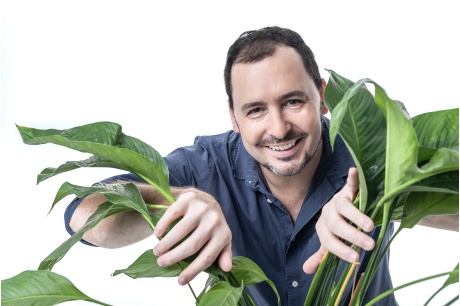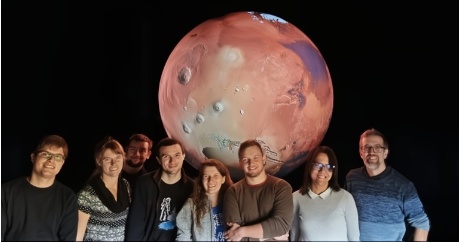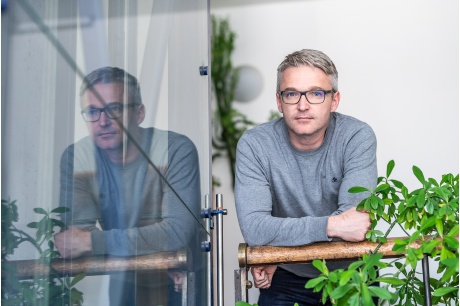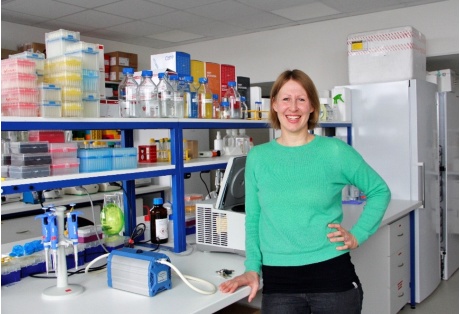
Four CAS projects get ERC Consolidator Grants, each to receive two million euros
03. 12. 2024
Four researchers from the Czech Academy of Sciences (CAS) have been awarded one of Europe’s most competitive grants, the ERC Consolidator Grant: Karel Žídek from the Institute of Plasma Physics of the CAS, Tomáš Pluskal from the Institute of Organic Chemistry and Biochemistry of the CAS, Martin Fotta from the Institute of Ethnology of the CAS, and Elisabeth Hehenberger from the Institute of Parasitology at the Biology Centre of the CAS. This marks a significant achievement for the CAS, which has secured the same number of Consolidator Grants as the University of Oxford, surpassing institutions like the University of Cambridge, which received one fewer grant.
“Researchers from all over the world can apply for these grants, provided that the majority of their research is conducted in an institution within an EU member state or a country associated with the EU Framework Programme. The sole evaluation criterion is the quality and potential of the project and the principal investigator,” explains Eva Zažímalová, President of the CAS and a former evaluator for the European Research Council.
Advancing enzyme development
Tomáš Pluskal’s project TerpenCode, conducted at the Institute of Organic Chemistry and Biochemistry of the CAS, focuses on the innovative application of machine learning in biochemistry to overcome obstacles in enzyme development. Currently, it is impossible to accurately predict the functions of newly discovered enzymes or to generate enzymes for specific reactions.
“Progress in this field has been slow and remains highly limited. We’re currently capable of creating new versions of known enzymes, but no one has yet managed to develop entirely new enzymes for reactions we’ve never seen before,” Pluskal explains why he decided to focus his research on this area. The researcher has also just been accepted into the prestigious ‘Young Investigator Programme’ of the European Molecular Biology Organization (EMBO).

Tomáš Pluskal. (CC)
If these current limitations are overcome, the research could lead to more efficient and environmentally sustainable production of pharmaceuticals, fragrances, biofuels, and other valuable chemical substances. That is because enzymes play a key role in biotechnology, catalyzing chemical reactions that are often difficult to achieve through organic synthesis. Read more about Pluskal's research in our interview with the researcher.
Pushing the limits of optics
Karel Žídek’s project, COINED, conducted at the TOPTEC Research Centre of the Institute of Plasma Physics of the CAS, will focus on studying thin-film optical coatings to push the boundaries of current optical technologies for applications in areas such as space missions and ground-based lasers. These coatings are often the most vulnerable component, having to withstand environmental stress, repeated heating, UV radiation, and mechanical strain.
“Our vision is to develop a hitherto missing method to effectively examine nanometer-scale interfaces within optical coatings – critical for preventing optical failures in satellite systems, for instance, where replacing defective components is impossible,” Žídek explains.

Karel Žídek (right) with his team.
Žídek’s team plans to develop a novel method using sequences of laser pulses to generate microscopic “earthquakes” in the coatings and observe the resulting wave reflections, akin to how seismologists study Earth. Over five years, the project will progress from simpler coatings to those destined for space and high-powered laser systems.
Roma families and war
Martin Fotta from the Institute of Ethnology of the CAS has received an ERC Grant for his project RAW: Roma Families in Times of War. While prior studies have examined the impact of armed conflicts and forced displacement on Roma communities, there is a lack of long-term research into Roma experiences of war and post-war recovery. Roma communities are present in every European and Middle Eastern country affected by war in the past three decades, yet little is known about how they maintained family ties, kinship networks, and community cohesion, or about the social scars left by war.
By means of ethnographic research among the Roma from Ukraine, Iraq, Syria, and the former Yugoslavia, Fotta’s project investigates how Roma mobilize kinship relationships and traditions as a means to cope with the consequences of war and how these conflicts reshape family structures.

Martin Fotta. (CC)
“We’ll focus on everyday care, changes in family bonds, and intergenerational relationships across various Roma communities and war contexts. This will offer a different perspective on how war affects social dynamics, viewed through the lens of an ethnic minority rather than just that of the majority population,” Fotta explains. His research aims to deepen understanding of social vulnerability, resilience, and how societal and cultural traditions persist in challenging circumstances. You can read more about Fotta’s research in the quarterly published by the Czech Academy of Sciences, A / Science and Research (now A / Magazine).
Uncovering the crimes of kleptoplastic single-celled organisms
Elisabeth Hehenberger from the Institute of Parasitology at the Biology Centre of the CAS focuses on the evolution of photosynthesis, using as a model unique marine algae that engage in kleptoplasty – the ability of certain organisms to “steal” the photosynthetic organelles (plastids) of their prey and use them for their own benefit. Her project, KLEPTOS, will explore this process to answer fundamental questions about the origins of photosynthesis.
“When we investigated a kleptoplastidic organism during my postdoc, we were able to provide the first evidence for a certain order of steps during plastid endosymbiosis,” explains Hehenberger, for whom this result was a turning point in her research career. This breakthrough inspired her to keep studying these plastid-stealing organisms to unravel the ancient process of plastid integration.
The ERC funding will allow Hehenberger to leverage her extensive experience with dinoflagellates, a complex group of organisms, to clarify this transformative evolutionary process. “Given its significance and ancient roots, we are convinced that our findings will influence research on various models of endosymbiosis. If we understand how this process works and are able to artificially recreate it, we could impact fields ranging from marine ecosystem conservation to sustainable energy production, efficient agriculture, and biofuel development,” the biologist adds.

Elisabeth Hehenberger.
Czech Republic among the top ten
ERC Consolidator Grants are open to researchers who obtained their PhDs seven to twelve years ago. Out of 2,313 applicants from across Europe, 328 researchers were successful, with the European Research Council distributing a total of 678 million euros. Ten projects from the Czech Republic received funding – four from the Czech Academy of Sciences, five from Charles University, and one from Masaryk University. This places the Czech Republic tenth in the number of awarded grants, tying with Norway and ahead of countries such as Finland, Belgium, and Denmark.
Written and prepared by: Zuzana Dupalová, External Relations Division, CAO of the CAS, drawing on the CAS press release
Translated by: Tereza Novická, External Relations Division, CAO of the CAS
Photo: Shutterstock; Jana Plavec, External Relations Division, CAO of the CAS; TOPTEC Center; Daniela Procházková, Biology Centre of the CAS
 The text and photos labeled CC are released for use under a Creative Commons license.
The text and photos labeled CC are released for use under a Creative Commons license.
Read also
- Moss as a predator? Photogenic Science reveals the beauty and humor in research
- How does the Academy Council plan to strengthen the Academy’s role? Part 2
- How does the Academy Council plan to strengthen the Academy’s role? Part 1
- Ombudsperson Dana Plavcová: We all play a role in creating a safe workplace
- ERC Consolidator Grant heads to the CAS for “wildlife on the move” project
- A little-known chapter of history: Czechoslovaks who fought in the Wehrmacht
- Twenty years of EURAXESS: Supporting researchers in motion
- Researching scent: Cleopatra’s legacy, Egyptian rituals, and ancient heritage
- The secret of termites: Long-lived social insects that live in advanced colonies
- Two ERC Synergy Grants awarded to the Czech Academy of Sciences
The Czech Academy of Sciences (the CAS)
The mission of the CAS
The primary mission of the CAS is to conduct research in a broad spectrum of natural, technical and social sciences as well as humanities. This research aims to advance progress of scientific knowledge at the international level, considering, however, the specific needs of the Czech society and the national culture.
President of the CAS
Prof. Eva Zažímalová has started her second term of office in May 2021. She is a respected scientist, and a Professor of Plant Anatomy and Physiology.
She is also a part of GCSA of the EU.